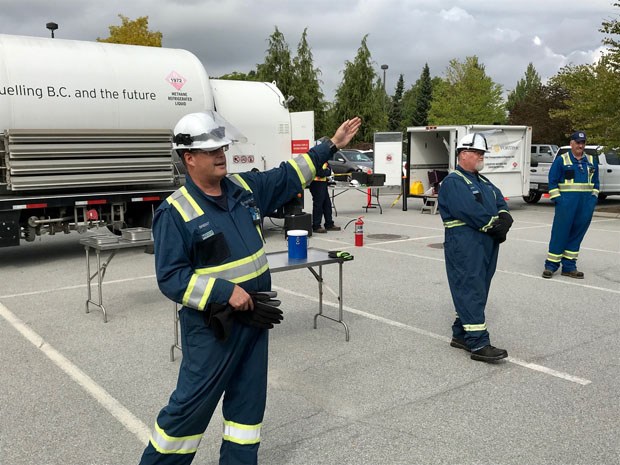Liquefied natural gas is going to play an even bigger role in Delta as well as the rest of the province, according to industry representatives and stakeholders.
The Delta Chamber of Commerce held a panel discussion Tuesday at the Beach Grove Golf Club to hear what’s in store for the industry from guest speakers Bryan Cox, CEO of the BC LNG Alliance, Doug Stout, FortisBC vice-president of market development and external relations, Delta city councillor Dan Copeland and Karen Ogen-Toews, CEO of the First Nations LNG Alliance.
The message they delivered was that there’s huge economic opportunity, both locally and for B.C., with LNG, a safe and more environmentally-friendly fuel source, especially when it comes to overseas markets, including China.
“LNG is real, it’s happening. We are building it here in British Columbia. We’ve been talking about it for a long, long time in this province, as we all know, and now we’re building it… we’re building this industry in partnership in a very different way. There’s a very huge demand for natural gas right now and British Columbia is perfectly positioned to take advantage of that,” Cox said.
He added the industry needs to find new markets for B.C.’s clean natural resource, noting a few years ago only about 10 countries around the world were importing LNG, but now there are 40 and counting.
Stout agreed, saying there’s further opportunities for expansion, while at least a half-dozen major shipping companies are looking to switch vessels calling on the port to LNG. BC Ferries has already begun converting vessels from marine diesel fuel to LNG.
Ogen-Toews said the industry is giving First Nations communities a chance to become part of the mainstream economy, but it’s critical First Nations, including the Tsawwassen First Nation, are consulted when it comes to expansion.
Noting there’s been no serious incidents at the FortisBC plant in Delta’s Tilbury industrial area since it opened in the early 1970s, Copeland, Delta’s former fire chief, spoke about the safety record and specialized training first responders have received in case something ever happens. He noted Delta has a close working relationship with the electricity and natural gas distribution utility.
Tom Corsie, vice-president of real estate for the Port of Vancouver, also spoke at Tuesday’s event, saying LNG is one of the “puzzle pieces” that will help make the port the most sustainable in the world. He pointed out there will likely be high demand in the next couple of years for ships to be able to be fueled with cleaner-burning LNG, something the port will be able to deliver.
Having expanded its Tilbury plant and new facilities elsewhere in recent years, FortisBC this summer announced it has entered into an agreement to export LNG to China. The agreement was made possible by the completion of the Tilbury expansion project.
The two-year agreement will see 53,000 tonnes of LNG a year, or about 60 ISO containers (standard-sized shipping containers) a week, shipped from Tilbury to China by the summer of 2021. The volume of LNG to be exported is equivalent to the volume necessary to heat more than 30,000 average B.C. households for a year.
In 2017, FortisBC became the first company in Canada to supply LNG for export to China. Since then, FortisBC says it had been supplying LNG to customers for export to China on a spot basis. With the expansion project adding LNG production capacity of 250,000 tonnes per year and additional storage capacity of 46,000 cubic metres, FortisBC says the Tilbury plant, which will undergo further expansion, is leading Canada’s export industry into uncharted territory.
Meanwhile, WesPac Midstream has applied for an environmental assessment certificate for its proposal to build a marine jetty facility north of the FortisBC Tilbury plant. The marine jetty on the Fraser River would be used for loading LNG from the plant to supply local and offshore markets, three million metric tonnes per year over 25 years. That project is still undergoing a review under the B.C. Environmental Assessment Act and the Canadian Environmental Assessment Act.



